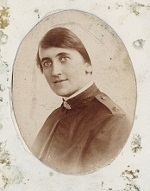
Divisions
- Home
- Tasmanian Government Policy and Programs
- Women's organisations to join
- Information and resources
- Tasmanian Honour Roll of Women
Contact Details
By phone
Find the number of a specific division or office to contact them directly or call Service Tasmania on 1300 135 513.
Our staff
Use the Tasmanian Government Directory to find staff contact details
Elsie May Cumming


Awarded for Community Service and Health
Born: 1885 Died: 1968
Entered on roll: 2015
"How these boys suffer! This war is absolute hell. We see and hear all day …every day the results of its frightfulness. We can hear the guns quite plainly."
- Elsie Tranter's diary entry, 2 May 1917
Elsie Tranter was a brave nurse who joined the Australian Army Service in 1916 and managed to write a compelling and engaging diary despite working long, hard shifts treating "horrific injuries" on the Western Front in France.
There were about 2 500 Australian nurses who served in World War One. Elsie’s diary is an account of a nurse’s wartime experience. It was published as the book In All These Lines: The Diary of Sister Elsie Tranter 1916-1919 by J M Gillings and J Richards. Extracts from Elsie’s diary were also used in More Than Bombs and Bandages by Dr Kirsty Harris, the docudrama, ANZAC Girls by Peter Rees and The Daughters of Mars by Thomas Keneally.
Elsie was one of a small number of nurses trained to administer anesthetics. She would sometimes assist in over 20 operations a day and not be off duty until after midnight.
Elsie was born in Fyansford, Victoria and met Tasmanian, Gordon Cumming, in France, during World War One. They married in 1922 and moved to Invermay in Launceston where Elsie’s war diary survived the 1929 floods. The couple later built a home at Newstead called ‘Gezaincourt’, named in honour of the place where Gordon proposed. Elsie considered the garden another room of the house. With her keen gardening skills and Gordon’s woodcarving, the Cumming home and garden was entered on the Tasmanian Heritage Register in 2012.
During the war, many soldiers entrusted Elsie with ‘last letters’ to write to their mothers in Australia and New Zealand. For the rest of her life, she took an interest in returned servicemen and women and for decades after the war wrote to patients she had nursed.
Caring for others was part of Elsie’s life. She nursed elderly relatives, assisted neighbours during bouts of poor health and took in struggling migrants.
Photo credit: Courtesy of the Cumming family.
 Tasmanian Honour Roll of Women
Tasmanian Honour Roll of Women